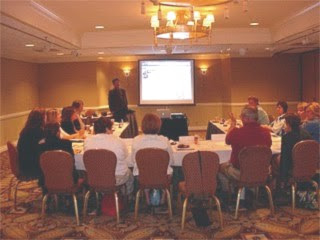Last but not least, we've got a summary of the informative session on what to watch out for - and ask for - when planning an event at a hotel or a resort. While not all of us have this as a regular duty, we've all got the opportunity to try our hands at planning an event as PICA members! If you join the board, you'll be helping to plan a workshop or two...so here we go!
Today's summary is brought to you by Assistant Secretary & Treasurer - and PICA Workshop speaker - Janet Wright.
Whether planning a company agent recognition luncheon or a full convention, the basics of contract negotiation, meeting room set-ups and planning meal functions are essentially the same. This is true whether the event involves a group of ten or 1,000, according to Carol Watson, director of Marketing/Communications, Independent Insurance Agents of Indiana, and Janet Wright, PICA assistant secretary/treasurer, in their joint presentation, “Top Tips and Pitfalls of Event Planning.”
 Jan and Carol give it to us straight - careful planning means having a successful event!
Jan and Carol give it to us straight - careful planning means having a successful event!
Careful contract negotiation is at the core of any successful event. Some basic items apply to any situation.
•Schedule negotiations early – ideally six months prior to your event. This allows time to avoid rushing decisions and gives time to develop a relationship with hotel representatives. It is most important to create a “win-win” outcome for both sides.
•Plan your budget before negotiating. Calculate fixed, variable and break-even costs. It is easier to negotiate prices and concessions if everyone is aware of what the budget is. Don’t forget special set-ups and audio/visual equipment needed in budgeting and negotiating.
•Remember that everything is negotiable. Compose a “wish list” of things you need and want for your event. Your specific preferences can get lost during the negotiation process unless you have them clearly in mind.
•Read every word of the contract once, twice, three times or more. Have an attorney review it, or – if you don’t have that luxury – have a peer read it and question every aspect that isn’t clear or doesn’t make sense.
When the event involves reserving a block of hotel rooms for attendees, meeting planners need to understand the meaning of a very important term: attrition. This is the difference between the actual number of sleeping rooms used and the minimum number of rooms specified in the hotel contract. Attrition is the allowable shortfall or slippage – usually 10 to 20 percent of the number you estimate your group will use – of the guarantee.
“Ask for 20 percent attrition in negotiating your contract,” Watson explained. “The hotel also will generally agree to include a calculation allowing for the unsold rooms in your block to be available for sale to the public after your room reservation deadline. Any rooms the hotel is able to sell before your event begins will be subtracted from your block, and you will only be charged for the remaining rooms they are not able to sell.
“Do not sign any contract that does not contain an attrition clause,” Watson continued. “Attrition not addressed in a contract gives the hotel free rein to make up the rules as they go. Get it in writing!”
Wright added, “There’s no substitute for advance planning. Go into any contractual situation – from a luncheon to a convention – knowing everything you want, the services you expect and the budget you have to work with. Be very clear about the details of your event with the hotel, banquet hall, restaurant or caterer. Never assume anything that isn’t agreed to by both parties in writing.”
For more contract negotiation details and tips, or for help with your event planning questions, email Carol Watson at watson@bigi.org, or Janet Wright at pica.jan@att.net.






 Examples of future technology that may provide exposure to the insurance industry include:
Examples of future technology that may provide exposure to the insurance industry include: During this session of the PICA workshop, Sharon Exarhos of Realty Executives of Nevada shared numerous ideas of communicating green to Company employees, agents, policyholders and community residents. During her presentation, Sharon provided the group with a “green” checklist to take back to the office to conduct our own green audit within our companies. PICA members also discussed green initiatives already taking place within their own companies.
During this session of the PICA workshop, Sharon Exarhos of Realty Executives of Nevada shared numerous ideas of communicating green to Company employees, agents, policyholders and community residents. During her presentation, Sharon provided the group with a “green” checklist to take back to the office to conduct our own green audit within our companies. PICA members also discussed green initiatives already taking place within their own companies.

